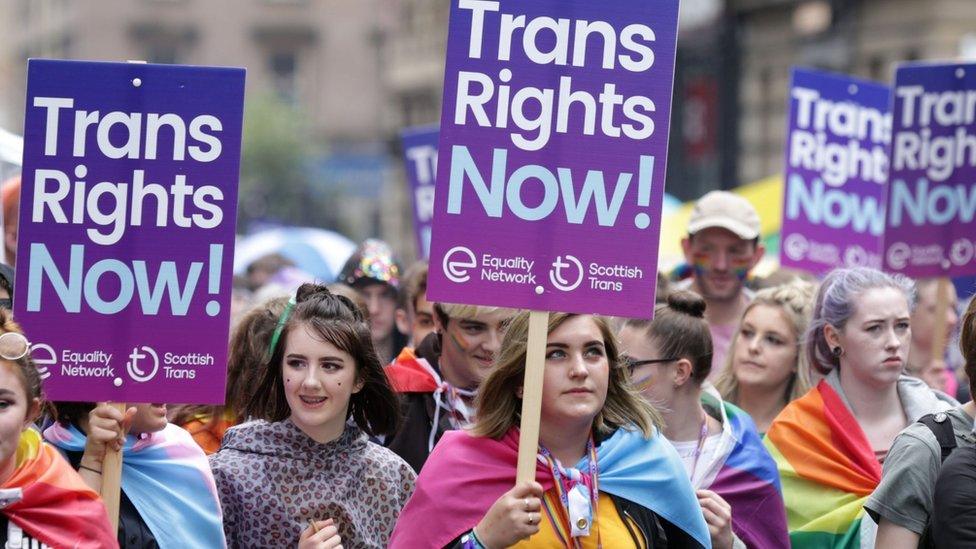Sir Keir Starmer and Scottish Labour split over self-ID for trans people
- Published
Sir Keir Starmer says he does not agree with Scottish Labour’s position on de-medicalisation of the self identification process.
Sir Keir Starmer has said that he disagrees with Scottish Labour's stance on how trans people should be able to change their legal sex.
On Monday, Labour said it would retain the need for a medical diagnosis of gender dysphoria when an application is made.
But Scottish Labour wants to remove the requirement.
The party's Scottish social justice spokesman said it continued to support "de-medicalisation" of the process.
Speaking to Nicky Campbell on 5 Live, Sir Keir said Labour wanted to modernise the process of obtaining a gender recognition certificate - the legal recognition of a trans person's "acquired" gender.
However he said he did not agree with Scottish Labour's stance on removing the medical diagnosis of gender dysphoria from the process.
Gender dysphoria is defined by the NHS, external as being caused by a "mismatch" between a person's biological sex and their gender identity.
In December, Scottish Labour MSPs were among those who passed a bill in the Scottish Parliament which would enable transgender people to self-identify their gender.
The rules would lower the age that people can apply for a gender recognition certificate (GRC) to 16, and remove the need for a diagnosis of gender dysphoria.
But in January the UK government used a Section 35 order to block the bill.
The Scottish government confirmed in April that it would launch a legal challenge to the Westminster block.

Keir Starmer disagrees with Scottish Labour leader Anas Sarwar on trans self-identification
When asked about Scottish Labour's stance, Mr Starmer said: "We don't agree.
"We don't think that self-identification is the right way forward."
The Labour leader told Nicky Campbell: "We've set out that we want to modernise the process, get rid of some of the indignities in the process and keep it a medical process.
"We've always said and continue to say that there should be safe places for women, particularly in relation to violence against women and girls.
"When I was director of public prosecutions, I spent a lot of time dealing with cases of violence against women and girls and therefore feel very strongly about the safe spaces for women."
The Scottish gender reforms were backed by most SNP, Labour, Liberal Democrat and Green MSPs.
But they were opposed by the majority of Conservatives who accused the government of attempting to avoid proper scrutiny of the legislation by rushing it through two days before Christmas.
They also raised concerns around the safety of women and girls.

On Wednesday Scottish Labour confirmed that it still supported removing the need for a medical diagnosis from the process.
Paul O'Kane, the party's social justice spokesman, said: "Labour is committed to modernising and reforming the outdated and intrusive Gender Recognition Act, as well as ensuring exemptions in the Equality Act are upheld.
"Scottish Labour continues to support the de-medicalisation of the process in Scotland.
"Labour is united in our aim to deliver reform, and the devolution settlement allows for different approaches within that."
The split comes amid tensions between Scottish Labour and the UK party. Earlier this month Scottish Labour said it would continue to oppose the two-child benefit cap despite Sir Keir insisting he would not scrap it.
'Very concerning'
Scottish Greens equality spokeswoman Maggie Chapman urged Scottish Labour maintain its position and not to "throw trans rights under the bus" as part of Sir Keir's campaign to reach Downing Street.
Ms Chapman said: "Gender Recognition Reform was supported by the overwhelming majority of the Scottish Parliament, including most Labour MSPs.
"Self-identification is used around the world. To see Labour backtracking on it is very concerning and disappointing."
She stressed the legislation was about making the administrative process of getting a GRC easier.
Ms Chapman added: "It was not about medical transition or any other intervention. Such an administrative process must not continue to be medicalised."
- Published25 July 2023

- Published8 December 2023

- Published16 January 2023
